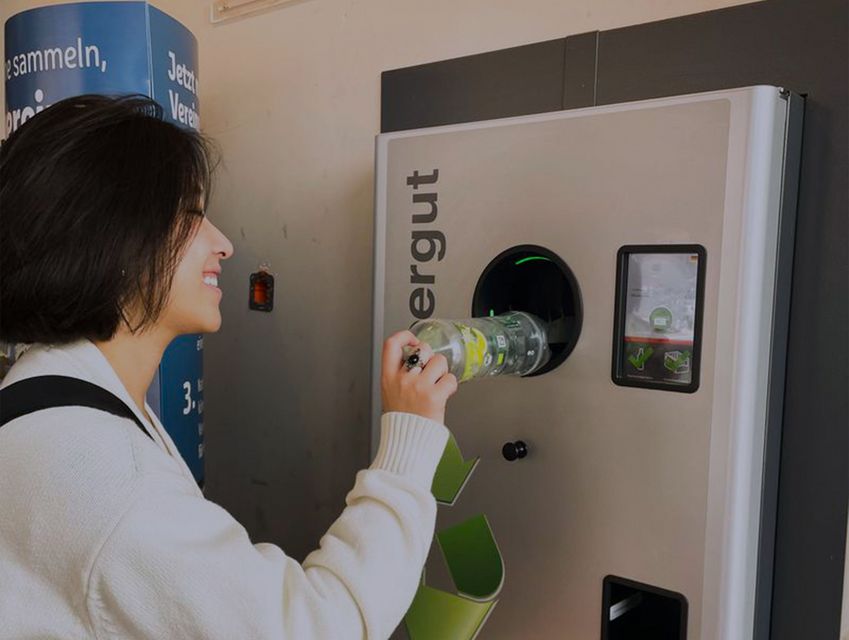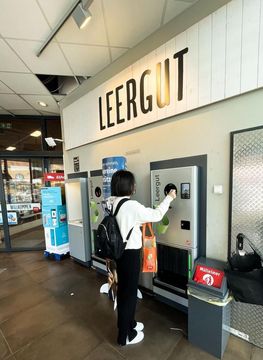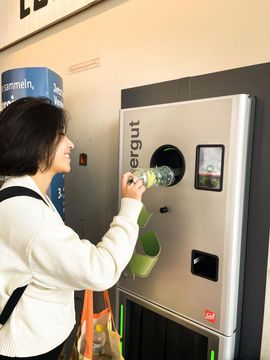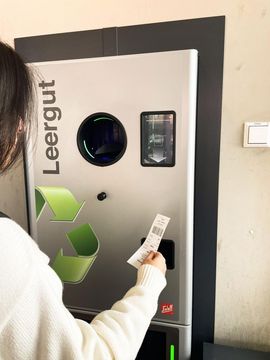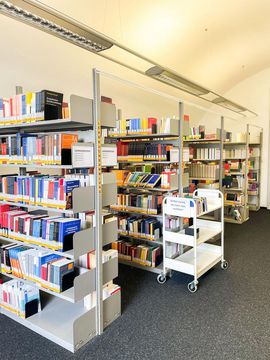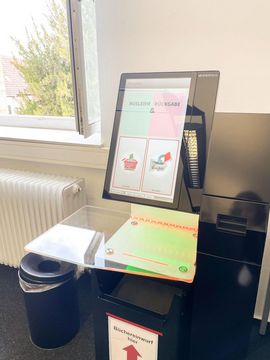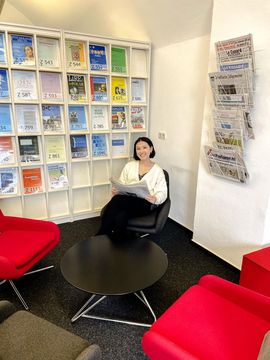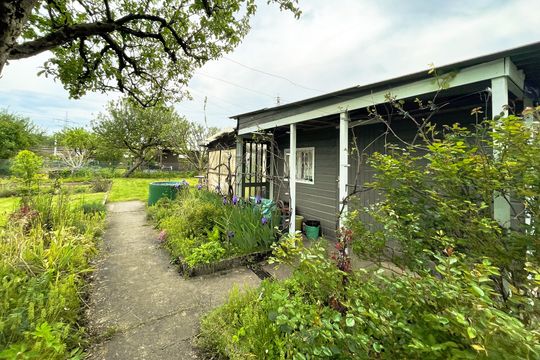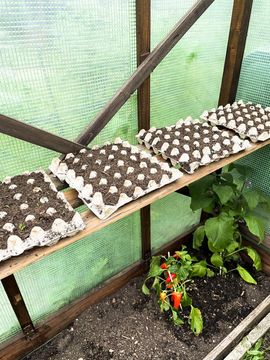GOING CIRCULAR
From raw materials to glass, from glass to bottles, from bottles back to glass, and round and round it goes. Returnable glass bottles are all about conserving our planet’s finite resources. Germany’s bottle recycling system was introduced decades ago. And it’s supremely easy to use, as Jinmeng, a translation student at Mainz university, will tell you. In fact, it was one of her first big discoveries on arrival from China. “What struck me is that you don’t have to feed the bottles into the machine individually – if you have a crate, you can just put the whole thing in. Such a great idea!”
In 2023, Germany’s lawmakers took this system a step further with a change to the country’s packaging legislation. Vendors offering take-away foods or beverages in single-use plastic packaging must now also offer equivalent products in reusable packaging.
GOING CIRCULAR IS ABOUT MORE THAN JUST GLASS
It also applies to other products and materials as well. For example, almost all PET plastic bottles used in Germany get recycled, and there is a growing move away from the use of plastic in many other areas. Supermarkets, for example, no longer provide plastic carrier bags. Instead, you’ll find paper bags and reusable cloth bags. Even plastic drinking straws, cutlery and drink cups have now given way to products made of sustainable, organic materials like bamboo or cornstarch. And at home, people carefully sort their waste, disposing of each type in the appropriate colour-coded wheelie bins: yellow for plastics, green (or brown) for biodegradable waste, blue for paper, and grey (or black) for non-recyclable waste. Jinmeng got on board with this system right away. “I’ve been sorting my waste very diligently from the beginning”, she says. “Sometimes I am even more careful than some of my German friends”, she adds with a smile.
RECYCLING AS CHARITY:
DON’T BIN THOSE BOTTLES!
If you ever see returnable bottles or cans lined up next to a public waste bin instead of in it, don’t worry – it’s not poor aim or laziness. It’s highly likely they’ve been placed there deliberately so that people in need can collect them and redeem them at supermarkets. Empties can be worth anything up to 25 eurocents each, so they soon add up!
Waste disposal
As well as household wheelie bins, almost every neighbourhood in Germany has recycling collection points where you can dispose of waste glass and larger cardboard boxes. Douaa, from Syria, really likes this idea: “I have a little tote bag in which I collect my empty glass jars (jam, pesto, etc.) so that I can take them to the local recycling centre at the end of the week. Another thing I really like is that there are flea markets, swap events and barter exchanges for used clothing. It’s nice to know that something you no longer want might be just what somebody else is looking for.”
SHARING IS CARING FOR THE ENVIRONMENT
Given our planet’s finite resources and rapidly expanding population, it’s obvious we can’t always be buying everything new. And we don’t need to either. For certain product types, the sharing economy offers plenty of alternatives, especially in Germany’s university cities. Why buy that textbook new when you can get the same thing second-hand for a lot less and in almost as good condition? Why fork out for a new pair of jeans when your local second-hand shop has alternatives that fit just as well and look just as good? And why upgrade to the latest shiny new smartphone or tablet every couple of years when you can buy similar models – thoroughly checked and backed by a full warranty – from a shop specialising in refurbished equipment?
If we’re willing to overcome our addiction to always buying new, we’ll find there’s a lot more money left over at the end of the month. Plus, we’ll be doing something to help the planet.
FOOD RESCUE, BULK FOOD STORES & FOOD SHARING
This sharing philosophy has also made it into Germany’s student dining halls, canteens, restaurants and supermarkets. Many of these sorts of outlets have joined the fight against food waste, offering unsold prepared foods and groceries nearing their best-before dates at bargain prices. There are even apps (such as Too Good To Go) to help you find these safe, delicious and cheap treats and save them from the landfill.
Or you can eliminate unnecessary packaging by shopping at bulk food stores (Unverpacktläden) – grocery retail outlets where all products are sold loose. Another great way to reduce food and packaging waste while also saving money.
Peer-to-peer food sharing apps are also growing in popularity in Germany. With this idea, sharing unwanted food is as simple as posting a brief description of whatever it is you won’t get around to eating yourself and then having someone reply and pick it up. Obviously, it works best in areas where distances between users are short – in small communities and student neighbourhoods, for example. It’s also a great way to network with others who, like you, know the true value of food and don’t believe in throwing it out.
In Germany, you’ll also find more and more students growing their own fruit, vegetables and herbs on their apartment balconies or in communal gardens. This is a cheaper – and often healthier – alternative to buying produce from supermarkets and grocers. What’s more, it’s part of the growing popularity of local sourcing and vegetarian and vegan foods – all of which help protect the environment by reducing greenhouse gas emissions.
CLEAN, AFFORDABLE MOBILITY
Germany boasts effectively running public transport networks for journeys of all kinds, from local to long-distance. Getting from A to B – and back again – is supremely safe and easy. And stunningly reliable, as Nathaly, from Peru, will tell you: „If there’s one thing, I’ve learned during my whole period living here, it’s that punctuality really matters. That includes the buses, which always run exactly on time. That never ceases to amaze me.“
For long-distance travel there’s the state-owned passenger rail carrier Deutsche Bahn (DB), as well as privately owned rail services, which tend to be a little cheaper. And for local and medium-distance travel there’s the Deutschlandticket (aka the D-Ticket or the 49-Euro-Ticket). Introduced in 2023, this is a true revolution in affordable mobility. Valid throughout Germany and costing just 49 euros per month, the ticket entitles you to unlimited travel across all forms of local and regional public transport – buses, U-Bahn (underground rail), S-Bahn (suburban rail) and regional rail services.
Two wheels are often better than four
German cities often have dedicated lanes for use by people on pushbikes, e-bikes and scooters. This is especially the case in university cities. To experience freedom at its sustainable two-wheeled best, we recommend a trip to one of the country’s famously bicycle-friendly cities – Münster and Heidelberg spring to mind.
Zero-Waste Germany?
Anna noticed that Germans rarely throw anything away. Instead, they give it away in boxes in front of their house or take clothes to second-hand shops. Learn more about the sustainability of the Germans in this video.
In line with this topic
The magazine
